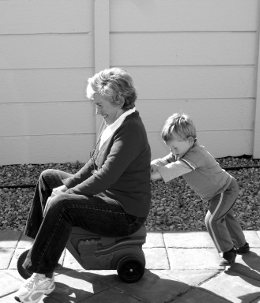Willing child-helpers still wear costs
 Grandparents are frequently roped-in to provide informal child care to their grandchildren, many say they are happy to do it, but research shows they get the short end of the stick.
Grandparents are frequently roped-in to provide informal child care to their grandchildren, many say they are happy to do it, but research shows they get the short end of the stick.
Grandparents often feel left out of the loop and out of pocket as a result, according to a new study from the University of Adelaide.
In a report published in the Journal of Family Studies, researchers sought to better understand the impact that regular yet informal childcare has on grandparents' emotional wellbeing.
“We know that many families are feeling the financial squeeze, especially single parent families, and they often turn to grandparents as an inexpensive and available source of ongoing child care,” says Cecily Young, a Clinical Psychologist at the University of Adelaide.
“Grandparents are usually pleased to be more closely involved in their grandchildren's lives, and they derive great satisfaction from that.
“However, they can also suffer from stress, increased fatigue, a sense of social isolation and a fair amount of financial strain, especially if the parents are not reimbursing them for out-of-pocket expenses.”
Ms Young’s study measured grandparents’ wellbeing in two ways; self-esteem as a representation of positive factors, and psychosocial distress as a representation of the negatives.
“Our results showed that grandparents' level of satisfaction with the care arrangements had much to do with their wellbeing,” she says.
“The specific details of the arrangements aren't important in and of themselves, what's really important is whether the grandparent feels they've been able to play an active role in making those agreements, that they have been heard, and that their needs are being taken seriously.
“The most important message arising from our work is for grandparents to feel confident and comfortable in expressing their needs when negotiating child care, and for all families to have frank and open discussions about this.”
Ms Young says parents should also be mindful that grandparents are potentially dealing with many issues at once, and it's important to take their other cares and responsibilities, as well as financial pressure, into account when discussing care-giving.








 Print
Print